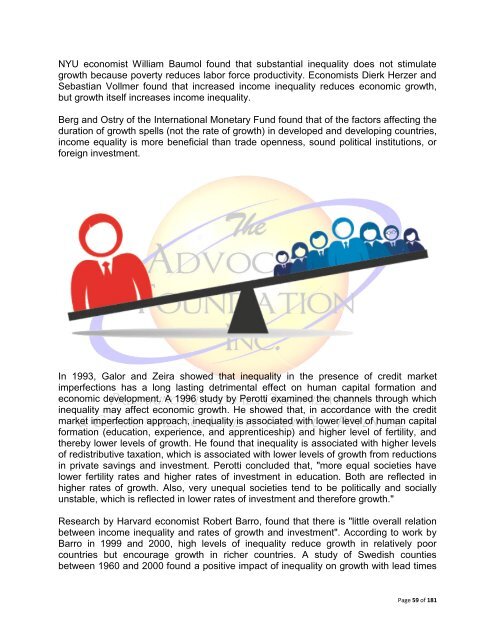You also want an ePaper? Increase the reach of your titles
YUMPU automatically turns print PDFs into web optimized ePapers that Google loves.
NYU economist William Baumol found that substantial inequality does not stimulate<br />
growth because poverty reduces labor force productivity. Economists Dierk Herzer and<br />
Sebastian Vollmer found that increased income inequality reduces economic growth,<br />
but growth itself increases income inequality.<br />
Berg and Ostry of the International Monetary Fund found that of the factors affecting the<br />
duration of growth spells (not the rate of growth) in developed and developing countries,<br />
income equality is more beneficial than trade openness, sound political institutions, or<br />
foreign investment.<br />
In 1993, Galor and Zeira showed that inequality in the presence of credit market<br />
imperfections has a long lasting detrimental effect on human capital formation and<br />
economic development. A 1996 study by Perotti examined the channels through which<br />
inequality may affect economic growth. He showed that, in accordance with the credit<br />
market imperfection approach, inequality is associated with lower level of human capital<br />
formation (education, experience, and apprenticeship) and higher level of fertility, and<br />
thereby lower levels of growth. He found that inequality is associated with higher levels<br />
of redistributive taxation, which is associated with lower levels of growth from reductions<br />
in private savings and investment. Perotti concluded that, "more equal societies have<br />
lower fertility rates and higher rates of investment in education. Both are reflected in<br />
higher rates of growth. Also, very unequal societies tend to be politically and socially<br />
unstable, which is reflected in lower rates of investment and therefore growth."<br />
Research by Harvard economist Robert Barro, found that there is "little overall relation<br />
between income inequality and rates of growth and investment". According to work by<br />
Barro in 1999 and 2000, high levels of inequality reduce growth in relatively poor<br />
countries but encourage growth in richer countries. A study of Swedish counties<br />
between 1960 and 2000 found a positive impact of inequality on growth with lead times<br />
Page 59 of 181

















